Umbrella Program on Climate Change Adaptation and Mitigation for Southeast Asia: Framework for Collaboration (2015-2020)
In line with the overall thrust of SEARCA in its 10th Five Year Plan (FYP) of inclusive and sustainable agricultural and rural development (ISARD), the Umbrella Program on Climate Change Adaptation and Mitigation for Southeast Asia or Umbrella Program on CChAM has been developed to serve as a platform for collaborative research and development (R&D), and knowledge management and capacity development (KMCD) on climate change adaptation and resiliency in Southeast Asia.
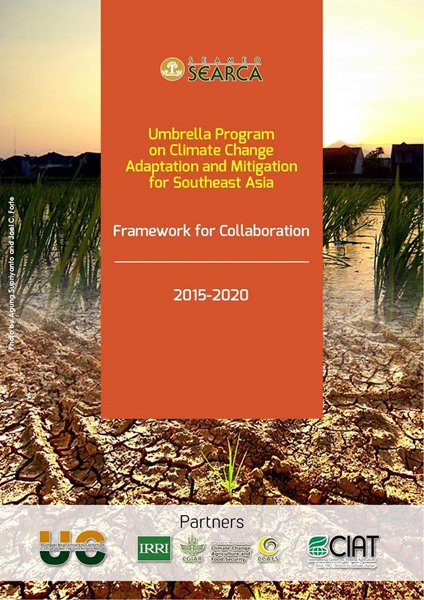 The Umbrella Program on CChAM is not an attempt to develop a new research agenda on climate change nor does it attempt to put all the existing research agenda of the partner institutions under one "umbrella program". In as much as institutions already have their respective priorities, focus areas on the subject matter, and accomplishments, this umbrella program identifies priority areas of convergence and collaboration at the regional and sub-regional levels, where institutions can work together, pool resources, and address gaps or move in directions where their joint efforts provide a strategic advantage for climate resiliency in SEA. It is hoped that the synergy created by the Umbrella Program can produce added value in terms of new knowledge, technologies, capacities, processes, and inputs to policies at the national and ASEAN levels than what is currently being generated by institutions working on their own specific research agenda.
The Umbrella Program on CChAM is not an attempt to develop a new research agenda on climate change nor does it attempt to put all the existing research agenda of the partner institutions under one "umbrella program". In as much as institutions already have their respective priorities, focus areas on the subject matter, and accomplishments, this umbrella program identifies priority areas of convergence and collaboration at the regional and sub-regional levels, where institutions can work together, pool resources, and address gaps or move in directions where their joint efforts provide a strategic advantage for climate resiliency in SEA. It is hoped that the synergy created by the Umbrella Program can produce added value in terms of new knowledge, technologies, capacities, processes, and inputs to policies at the national and ASEAN levels than what is currently being generated by institutions working on their own specific research agenda.
This Umbrella Program on CChAM is seen as strategic and is anchored on the ASEAN Multi-Sectoral Framework on Climate Change (AFCC) and reflective of areas where there is willingness to collaborate at the regional level among the participating institutions. It can also support the implementation of the ASEAN Vision for Food, Agriculture and Forestry (2016-2025) where climate change will be a crucial concern. It is likewise drawn from the work, experiences, and lessons of other institutions and research programs working on related subject matter. The framework for collaboration shown below and the thematic/subthematic projects and activities laid out have been developed from a scoping study of frameworks, initiatives, and literature on climate change in the region and validated in the Regional Consultation Workshop held on 12-14 May 2015 in Hanoi, Vietnam with 59 participants, representing government, academe and research institutions, non-government organizations, and international organizations based in different countries.
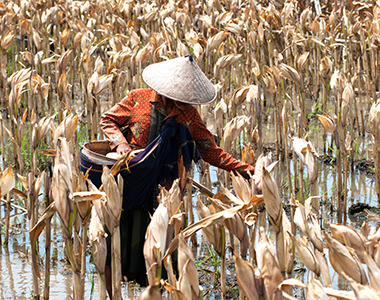
Theme 1 Assessing climate change impacts and risks for policy, plans, and investments
Sub-Theme 1.1. Impacts of climate change on and risks to agriculture, forestry, fisheries and livestock
- Project 1.1.1 – Tailoring broader recommendations into context-based, problem-oriented climate information (need portal for common access to data)
- Project 1.1.2 – Adapting to pest and disease outbreaks under new climate regimes (monitoring/mapping and development of best practices)
Sub-Theme 1.2. Impacts and risk assessment of climate change on environmental goods and services, especially on biological diversity
- Project 1.2.1 – Evaluation of rice biodiversity for new climate regimes
- Project 1.2.2 – Land use change trends and effects on agrobiodiversity
Sub-Theme 1.3. Socio-economic impacts and risks of climate change to small-scale farmers, fisherfolks and marginalized sectors and identification of the most vulnerable groups and priority geographic areas and communities for climate change interventions
- Project 1.3.1 – Development of diversified farming systems to increase farm resilience (including off-farm practices)
- Project 1.3.2 – Social vulnerability assessment (Mapping of key players, landowners, vulnerable groups; Gender sensitive issues; Market factors; Capacity building; Providing farmers with a portfolio of adaptation options)
Sub-Theme 1.4. Development and testing of vulnerability/risk assessment tools for agriculture, forestry and fisheries
- Project 1.4.1 – Mapping and analysis of Climate-Smart Agriculture (CSA) by context
- Project 1.4.2 – Identifying common indicators for assessment of mitigation strategies (comparison of existing model
- Project Project 1.4.3 – Mainstreaming CSA results to development planning for agriculture (identifying barriers to adoption for smallholders-economic and technical aspects)
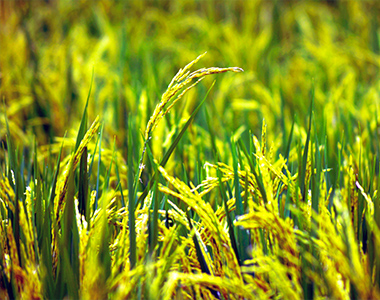
Theme 2 Advancing low-carbon agriculture and rural development
Sub-Theme 2.1. Assessment of the contribution of agriculture, forestry, fisheries, and livestock through greenhouse gas (GHG) sequestration/emission to climate change
- Project 2.1.1 – Analysis of key GHG emission source and identification of highest potential to reduce/sequestrate emissions
- Project 2.1.2 – Develop tools for GHG emission quantification for the agricultural, forestry, aquaculture and livestock sector
- Project 2.1.3 – System and landscape approach to measurement of GHG emission (including land use changes, peatlands etc.)
Sub-Theme 2.2. Determination of low-emission agricultural/ rural livelihood technologies and practices
- Project 2.2.1 – Documentation of low-emission technologies and practices, barriers to adoption and outscale mechanisms in Southeast Asia
- Project 2.2.2 – Policies to promote low-carbon agriculture and rural development including incentive system (e.g. payment for environmental services) to benefit the vulnerable communities and groups
- Project 2.2.3 – Develop two platforms (SEA-specific and global) to encourage data, knowledge and experience transfer on low emission technologies and practices.
Sub-Theme 2.3. Incentive system for low-emission agriculture and rural development (e.g. payment for environmental services) to benefit the vulnerable communities and groups
- Project 2.3.1 – Low-emission research results to be integrated into national mitigation policies (Nationally Appropriate Mitigation Actions or NAMAs) and supraregional integration areas (ASEAN)
- Project 2.3.2 – Piloting co-investment schemes (farmer, private and public sector) as rewards for low emission agriculture in different contextual settings
- Project 2.3.3 – Create and support equitable access to funds for capacity building (on national and local level)
- Project 2.3.4 – Ensuring equitable benefits and carbon rights on the carbon market
- Project 2.3.5 – Awareness raising: Results of trade-off analysis and co-benefits are translated and disseminated into communication materials (targeting policy-makers, farmers, private sector, development sector and extension-workers)
- Project 2.3.6 – Design of Measurement, Reporting, and Verification (MRV) schemes for key crops
- Project 2.3.7 – Certification schemes as an incentive for good practices and additional income source
- Project 2.3.8 – Research and development of potential Payment for Ecosystem Services schemes
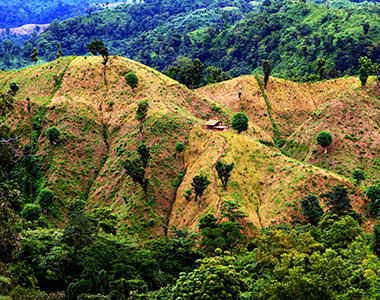
Theme 3 Enhancing proactive adaptation to climate change, variability, and extremes
Sub-Theme 3.1. Tested, effective and proactive adaptation technologies and practices in agricultural and rural livelihoods that meet the needs of vulnerable groups/ communities and geographic areas
- Project 3.1.1 – Climate-resilient Crops and Livestock (Breeding Climate-Resilient Crops/Livestock) R&D Projects: Testing/Piloting of resilient crops/livestock; Survey and analysis of climate-resilient adaptation technologies found effective in respective countries (biological, physical & anthropogenic) KM Projects: Database development of climate-resilient crops/livestock; (FSC-sponsored) Regional Workshop on Breeding Rice for Food and Nutrition Security; Regional Conference on Effective Biological, Physical, and Anthropogenic Climate-Resilient Adaptation Technologies & Strategies Developed
- Project 3.1.2 – Climate-Resilient Cultural Practices R&D Projects: Environmental Modification for Improving Performance under a Changing Climate; Dynamic Cropping Calendar; Applying Integrated (R&D) Farming Techniques to Adapt to CC (IPM & Optimal Application of Fertilizers); Survey and Documentation of Lessons Learned and Appropriate Climate-Resilient Cultural Practices; Energy-Efficient Innovation (e.g. solar-powered irrigation); Innovative Technologies to reduce GHG emission in Livestock
- Project 3.1.3 – Postharvest Systems R&D Projects: Postharvest Physiology of Local/ASEAN Crops; Special Postharvest Techniques for Special Crops harvested due to CC extreme events
- Project 3.1.4 – Agricultural Systems
Sub-Theme 3.2. Indigenous knowledge and practices on climate change adaptation
- Project 3.2.1 – (R&D) Survey and Documentation of Indigenous Knowledge & Practices
- Project 3.2.2 – (KM) Conference/Seminar on Indigenous Knowledge: Adopted Practices for Climate Change Adaptation
- Project 3.2.3 – (CB) Training of Farmer-Trainers
Sub-Theme 3.3. Options, constraints/limits and economics of adaptation particularly among poor farmers, women, and other marginalised groups
- Project 3.3.1 – (R&D) Socio-economic Analysis to compare Climate-resilient technologies across ASEAN
- Project 3.3.2 – (R&D) Participatory Land Use Planning for Climate Change Adaptation at the Community Level
- Project 3.3.3 – (R&D) Case Studies of Options, Constraints/Limits and Economics of Adaptation for Coastal, Upland Farming and Fishing Communities
- Project 3.3.4 – (KM) Focus group discussions among project community partners and project implementers on options, constraints and the economics of selected climate change adaptation
Sub-Theme 3.4 . Climate risk reduction and sharing in agriculture and rural development (e.g. early warning system and agricultural insurance) that benefit smallholder/poor communities
- Project 3.4.1 – (R&D) Weather-Index Based Crop and Livestock Insurance
- Project 3.4.2 – (R&D) Pest surveillance/Pest Forecasting and Warning Systems/Cross-border Pests/Zoonotic Diseases
- Project 3.4.3 – (R&D) Crop Simulation Models and Expert System
- Project 3.4.4 – (KM) Workshop on Crop-Pest Models and Crop Simulation Models
Sub-Theme 3.5. Role of various sectors (government, private sector, and civil society) in transformational adaptation
- Project 3.5.1 – (R&D) Survey and Documentation
- Project 3.5.2 – (KM) Workshop on Role of Various Sectors on Climate Change Adaptation
- Project 3.5.3 – (KM) Conference/Seminar/ Workshop on Good Practices of Extension System of Selected Technologies
Sub-Theme 3.6. Cross-cutting Concerns
- Project 3.6.1 – (R&D) Survey and Documentation
- Project 3.6.2 – (KM) Development of Training Materials for Pro-active Adaptation Technologies
- Project 3.6.3 – (KM) International Workshop for Climate Change Adaptation on Agriculture and Rural Livelihood
- Project 3.6.4 – (CD) Support for/ Strengthening Capacity of Educational Institutions Running Postgraduate Programs related to Climate Change Adaptation
- Project 3.6.5 – (CD) (for Masters, PhD by Research)Double Degree programs (bilateral agreements); Joint Degree programs within ASEAN; Joint Degree program with AGRINATURA
- Project 3.6.6 – (CD) Exchange of Faculty, Researchers and Students (for Research)
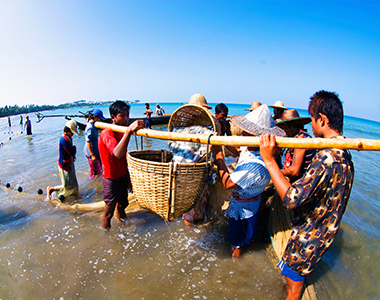
Theme 4 Enabling policies (including processes) and governance for climate-resilient agriculture and rural communities (cross-cutting theme)
Sub-Theme 4.1. Analysis of policies constraining and facilitating current and emerging policies with pilot policy intervention case studies for climate resilient ARD
- Project 4.1.1 – Improving Regional Climate Change Adaptation Policy (Policy gap analysis, Policy forum to improve agricultural policy vis-à-vis climate change: first national, then regional)
Sub-Theme 4.2. Decision support tools for policy advocacy and development and investment choices in climate resilient ARD
- Project 4.2.1 – Assessing Adaptation Options and Providing Platforms for Knowledge Sharing (Identify adaptation options for a segmented rural population-inventory of adaptation options; Cost-benefit analysis for policy options before implementation; Media & social network used as decision support tools; Portal for sharing/pooling decision support tools)
Sub-Theme 4.3. Enabling policies and institutional mechanisms to mainstream integration of adaptation and mitigation in ARD planning
- Project 4.3.1 – Developing Adaptation-Related Indicators
- Project 4.3.2 – Mainstreaming CA in ARD and other policies (Workshops on integrating CCA in development policies, planning, and investments; Integration of CC strategies to economic and development policies)
- Project 4.3.3 – Coping with Climate Change through agricultural insurance (Policy roundtable on agricultural insurance; Policy support for the creation of agricultural insurance institution coping with CC impacts (with the private sector); Advocacy and incentives for investors to participate in insurance and other financial firms; CChAM benefit sharing mechanism)
Sub-Theme 4.4. Climate Advisory Services
- Project 4.4.1 – Effective communication of climate information to key stakeholders (Alliance networking for climate advisory services at the local, national, regional; Website for climate information)
Sub-Theme 4.5. Effective communication and best practices in bridging the science-policy divide
- Project 4.5.1 – Case writing for case story books on tested CCA solutions
- Project 4.5.2 – Narrowing the science-policy-practice gap in CChAM (Policy forum/workshops for scientists and policy makers (ministry level officers, national level); Agricultural Climate Change governance by communication-dissemination of info on agri policies and regulations)
Sub-Theme 4.6. Climate financing and investments
- Project 4.6.1 – Training-workshop on climate change financing and investments (outcome of agri insurance PRT)
Sub-Theme 4.7. Scaling up good and innovative practices on CChAM
- Project 4.7.1 – Achieving impact through evidence-based policy development
- Household typologies (regional)
- Innovation impact assessment for technologies on CC adaptation
- Identification of innovative practices on CChAM
- Studies and lessons on scaling up
Contact Us
Knowledge Center on Climate Change (KC3)
and Research in Agriculture (SEARCA)
- College, Los Baños, 4031 Laguna, Philippines
- +63 49 554 9330 to 39 +63 49 536 2290 +63 49 572 3743 +63 2 8657 1300 to 02 local 3200 to 3204
- +63 49 536 7097














